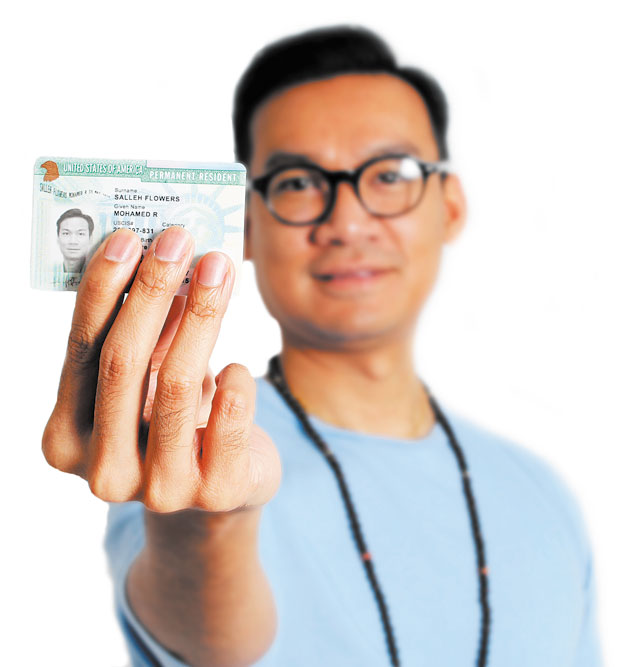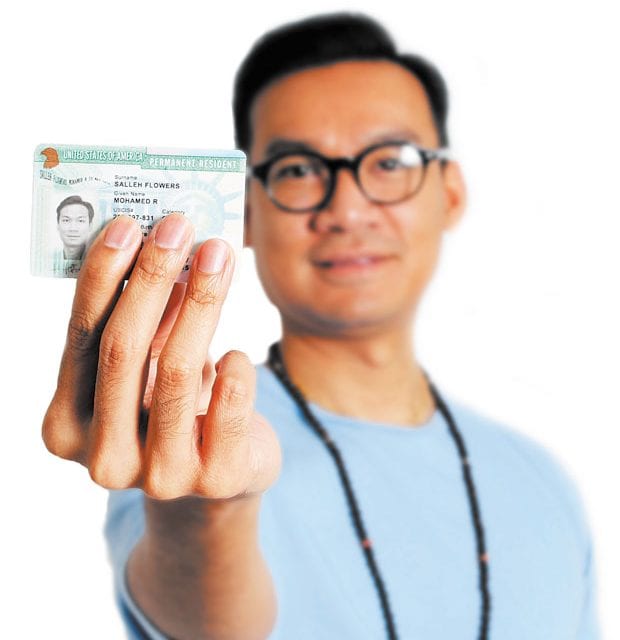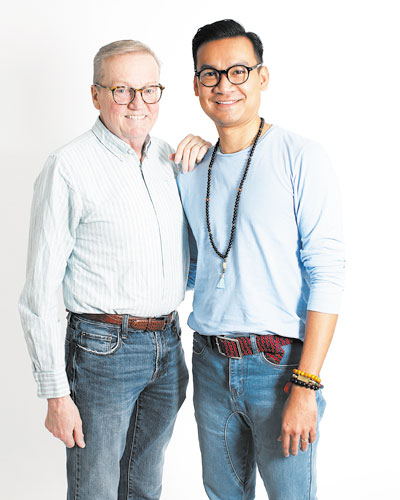After 19 years, a married couple is no longer threatened with separation since the non-U.S.-born partner received his green card

PROUD DALLASITE | RafiQ Salleh proudly shows off his green card. The Windsor decision paved the way for him to attain his permanent residency status. (Tammye Nash/Dallas Voice)
DAVID TAFFET | Senior Staff Writer
RafiQ Salleh Flowers hopes to be in the newspaper only once more — when he receives his U.S. citizenship. For now, he’s proud to show off his new green card.
Salleh has been working on his obtaining his permanent resident status since he and husband Cannon Flowers met 19 years ago. And it hasn’t been easy.
Along the way, he was detained in Singapore. Twice. Homeland Security mistook him for another other RafiQ Salleh, the terrorist they were already holding in Guantanamo.
Salleh remained in the U.S. on an entrepreneurial visa by starting a business. But when it came time to renew that visa two years later, he ended up managing his North Dallas business in the middle of the night from halfway around the world while he was being detained in his home country awaiting a visa that had already been approved.
Once a member of Congress had to intervene on his behalf to get him back home to Dallas.
After 19 years, Salleh now shows off his green card to anyone who asks. His husband said at least three times a day he repeats, “I have a green card.”
Salleh and Flowers met in Singapore. Flowers was there for two-and-a-half years, working for Texas Instruments. When that assignment ended in 1998, Salleh moved to Dallas with Flowers on a student visa.
After receiving every degree he could possibly earn and no longer qualifying for a student visa, Salleh remained in the U.S. on an entrepreneurial visa.
What Salleh couldn’t get was permanent residency based on his relationship with an American citizen. The Defense of Marriage Act prevented the federal government from recognizing their relationship.
That changed after the U.S. v Windsor case overturned one section of DOMA. Since the June 2013 ruling, one federal agency after another has announced it would recognize same-sex marriages based on place of celebration. The U.S. Department of Immigration announced more than a year ago it would recognize marriages of same-sex couples for visa and citizenship purposes.
In January 2014, Salleh and Flowers went to San Francisco to obtain a marriage license, then began the application process for a green card in June. By October, they received confirmation that the application was in process and, in January, a final interview was scheduled for February.
Before the interview, Salleh had to go for a medical exam. Flowers said that was a holdover from the AIDS crisis when someone with HIV was excluded from coming into the country.
Flowers said their attorney, John Nechman, prepped them for the interview. Nechman told them they’d probably be interviewed together. He said he had straight couples they’d separated during the interview, but never a same-sex couple.
But shortly after the interview began, Salleh said, Flowers was taken out of the room.
“I don’t think the officer had done one of these before,” Flowers said.
Dallas immigration attorney Josh Turin said in heterosexual marriages, there are high incidents of fraud, maybe as high as 20 percent of cases filed. With same-sex couples, he said, there’s a wellspring of cases, with most of the applications for long-term couples.
“There’s little doubt of the sincerity,” Turin said.
Sallah said his impression was the officer wasn’t comfortable talking to a same-sex couple.
The questions were designed to see whether they were actually a couple — things like what had they done over the past week.
The rest of the time the officer spent with Salleh was reviewing the application — visas he’s had over the years, letters of recommendation and other items in the file.
Turin said part of the application process is simply proving you’re a couple. Not only would official documents like a marriage license be included, but pictures together in different places, letters from friends confirming the relationship and leases or utility bills paid jointly.
When Flowers was called into the interview, he said he was asked about what visas Salleh has had over the years and what the couple did the previous Sunday — where they were, what they ate, who they were with.
Their answers matched, but that wouldn’t surprise anyone who knew the couple. When Salleh and Flowers were separated for two months because Homeland Security put a hold on Salleh’s visa before he was boarding the plane back to the U.S., Flowers could only have been described as morose. Together, they often finish each other’s sentences.
Once the interview was finished, the officer told Flowers and attorney Nechman, who sat through the interviews, they’d have an answer shortly, then asked if they had any questions for him. Flowers said no, but Nechman said he had a question — would his client be approved?
When he didn’t get a direct answer, he asked several more times. The officer finally indicated that there was no problem.
Within a few days, Salleh’s green card arrived in the mail.
Nechman said because Salleh and Flowers were not married a full two years before the green card was issued, Salleh received a provisional two-year card. In 2016, they’ll have to re-apply, this time for a full 10-year green card.
Three years after having his green card, Salleh can finally apply for citizenship.
“This was one of the strongest cases I’ve ever filed,” Nechman said. “Their story couldn’t have been more detailed.”
Turin said it is a good idea for any couple seeking a green card to have at least a consultation with an attorney familiar with all the changes in policy for same-sex couples.
He warned that other factors that may have nothing to do with the validity of the relationship may need to be fixed before applying for the green card. Other things may not be able to be fixed, but he said it’s better to know that before spending a lot of money on the application process.
Turin called the atmosphere “extremely favorable” for same-sex couples applying for permanent resident status for the non-U.S. spouse.
“They’re bending over backwards,” Turin said. “These interviews have gone quickly and smoothly for us.”
This article appeared in the Dallas Voice print edition March 6, 2015.



